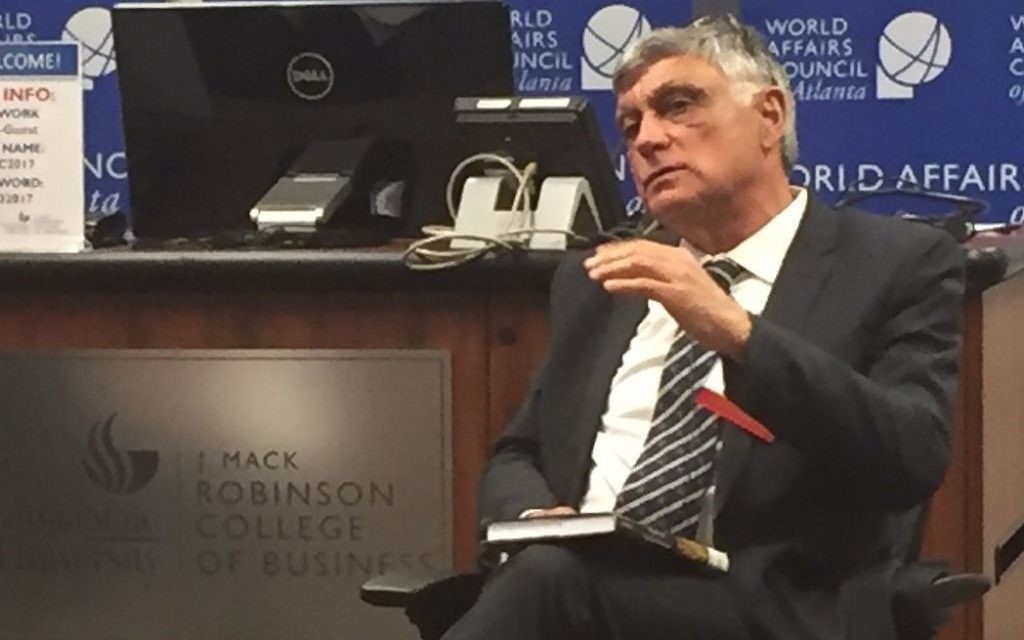Middle East Offers New Friends if Not Allies
Israel, Middle East strengthen relations amid common terror threats

The threats of terrorist organizations such as Islamic State and the aggressions of Iran have produced new levels of cooperation between Israel and many of its Arab neighbors.
To expand on that topic, the World Affairs Council of Atlanta invited Ambassador Haim Koren, who served as Israel’s ambassador to Egypt and South Sudan, to share his views on the new era of Israeli-Arab relations.
Israel has few allies in the Middle East, but common interests with some Arab countries have led to stronger relationships.
Get The AJT Newsletter by email and never miss our top stories Free Sign Up
“Israel has never had a better relationship with Egypt since the Camp David Accords,” Koren said, partly because Abdel Fattah el-Sisi seized power from Muslim Brotherhood leader Mohamed Morsi in 2013.
“You now have an Arab Muslim leader who is ready to fight terrorism with the backing of the government and the Egyptian people,” Koren said. “The Muslim Brotherhood was an organ of Egyptian society for eight years, but Egypt was approaching a different period.”
One key is Iran, Koren said. “Iran remains an enemy for Israel, Egypt, Saudi Arabia and the Emirates, and for the first time we are all in a coalition against the country to help fight terror.”
The process is not always easy. For 30 years under Hosni Mubarak, Israel’s relations with Egypt were strictly government to government, and the Egyptian educational system continued to preach hate against Israel, Koren said. “He kept a frozen peace with Israel. Whenever there were issues, he would ask people to protest and failed to educate the masses on anti-Semitism.”
Sisi, however, “quickly realized the circumstances have changed in the Middle East, and peace requires two to tango.”
Israel also has fortified its relationship with Jordan.
“Jordan is like a sister to Israel, and people should not believe fake news or the media. They have been cooperating with us for years,” Koren said.
Saudi Arabia also is willing to compromise for security.
“I don’t think Saudi Arabia or its people were born to love Jews or are enthusiastic about the state of Israel, but they are extremely afraid of terrorism and need help,” Koren said.
The same mentality applies to the United Arab Emirates, Koren said. “While Israel and the Emirates have never really shared a strong connection to one another, it depends on who you point out. Our relationship with Abu Dhabi is not great, for example, but it’s also not formal.”
Syria, on the other hand, remains a threat to Israel’s security, he said. “Syria is less than 40 miles away, and you have Hezbollah, ISIS and Iran all there, with Israel in the middle. While Assad is the only leader who has preserved stability in the region, he is also among the many who have gassed their own people yet blames South Sudan for human rights violations. When you use incorrect terminology to portray the reality, then you will never succeed to tackle the problem.”
Meanwhile, Lebanon is hosting Hezbollah, a Shia proxy of Iran, and missiles, money, training and Assad are being used to create a conflict based on religion, not nationality.
“To build an effective coalition against Israel, Lebanon called on their Sunni brothers and Iran to provide them with whatever they needed to keep Israel busy. In the meantime, Iran has continued its nuclear capabilities, simply because terrorism is an integral part of the country’s foreign policy,” Koren said.
Whenever Israel tried to get closer to the Palestinians, Iran built tension to try to isolate Israel and promote its own interests in the Middle East.
Perhaps Israel’s most awkward relationship with a Muslim neighbor is with Turkey.
President Recep Tayyip Erdogan radicalized his policies and spread hatred of Israel to strengthen his position in the Middle East, but his strategy backfired and led to an attempted coup last year.
That situation and cooperation in natural gas exports have restored diplomatic ties between Israel and Turkey, but Koren said no one can trust Erdogan.
“This is our neighborhood,” Koren said. “We didn’t choose to have it, but we have to learn to deal with that.”




comments